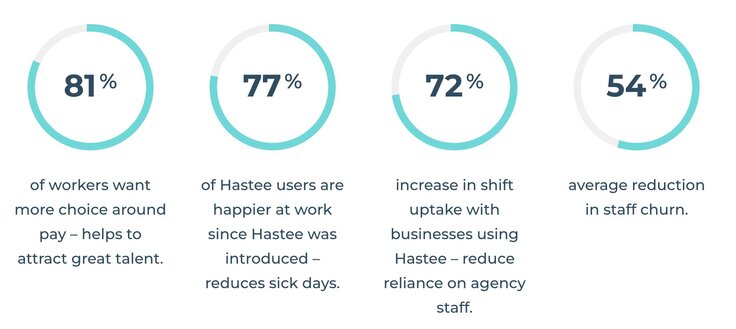
Article
4 min read
Employee Retention Masterclass – Driving employee retention through financial wellbeing
Sofia Ellmén
Feb 2, 2024
Chapters

Employee Retention Masterclass – Driving employee retention through financial wellbeing
Small hospitality businesses have come under a lot of pressure recently. Brexit marked the start of staff shortages and was shortly followed by the pandemic’s lockdowns. Now the industry is battling rising costs across the board; increases in the National Minimal Wage, higher corporate taxes and soaring interest rates and energy prices.
So how can businesses go from fighting finances to sustainable growth?
The latest Xero Small Business Insights shows that 2023 sales only rose 2.2% in the year to the September quarter. This is much slower than the double-digit growth experienced at the start of the year. It also shows that wages in the hospitality industry are rising faster than the UK average, increasing up to 4.3% compared to a 3.5% overall wage increase. Despite hospitality offering better wages than ever before, it’s still struggling to find talent.
Happy employees make a better business
A business doesn’t just need talented people to operate – it needs them to grow. A lack of talent impacts your guests’ satisfaction and reviews. Overworking staff raises stress and lowers job satisfaction, which leads to a rise in sick days and employees not showing up for work. Unhappy employees lead to low work morale, poor customer service and dissatisfied guests.
It’s vital to make sure your existing, talented staff are happy and empowered to do their job to the best of their ability. And, more importantly, want to stay.
After all, motivated people who do their best everyday to serve guests leave them so happy that they’ll keep coming back for more. And that’ll help your business grow.
Planday partner, FlexEarn, surveyed 4,000 participants in its Financial Resilience survey and found up to 73% of the respondents felt encouraged to accept a greater number of shifts after gaining better visibility over their earnings.
Smart tech to improve staff retention
One reason why talented people decide to leave the hospitality industry is the unpredictability of future income. The uncertainty around how many hours you will get assigned and paid for, makes it hard for people to plan their finances, leaving them more vulnerable to unexpected expenses.
The annual Wellbeing Survey by Planday partner Hastee, which surveyed 2,087 employees from different industries across the UK, indicates that financial stress can also negatively affect employees’ wellbeing. The survey shows that up to 33% of 25-34 year olds are forced to rely on their savings to cover any unexpected expenses between pay days and 26% of all respondents say that worrying about finances has negatively affected their mental health.
If the business is slow one day or has a sudden surge in canceled bookings, it might have to send staff home on an hour's notice or remove shifts from the planned schedule. This leaves employees who had planned their expenses around a 40-hour work week with a paycheck for only 30 hours.
Ditching pen and paper for Planday’s smart scheduling helps managers communicate last-minute changes faster, gives staff a comprehensive overview of their planned shifts for the week or month ahead and the ability to request more shifts.
But employees can’t see their earnings at the end of each shift.
Planday is partnering with fintech providers to bridge this gap, so employees can feel more in charge of their work and stay motivated.
“We are always looking to optimise the customer experience. By finding partners, who complement our offering, we can serve our customers even better. Planday’s mission is to make our customers’ day work. By automating manual tasks and improving communication between managers and employees, we free up time for them to focus on what really matters – creating amazing guest experiences and enjoying life outside of work. ” - Sofia Ellmén, Global Partnerships Marketing Lead, Planday
Our fintech partners give employees instant access to their earnings, an overview of their income over time and help budgeting for the future. Through integrations, Planday can push shift data into our partner’s software, enabling employees to see all of their approved shifts and claim a portion of their earned wages in the partner’s app after completing a shift.
“Companies using our app can enable their staff to withdraw up to 50% of their pay after they've finished working a shift. This gives team members more financial freedom, because they can cover unexpected expenses, alongside other positive effects. Gaining better visibility to what you are going to earn has increased the uptake of vacant shifts among our customers. This is a positive side-effect for companies, who can now reduce their need for expensive agency cover and instead have their own staff more motivated to take on extra shifts." - Jonathan David, CEO and Founder, FlexEarn
Pay staff faster without disrupting your cash flow
But what about business owners? How can they manage their cash flow if they have to pay employees before payday? Planday partner Hastee explains how business owners can offer this benefit to their employees without risking cash flow disruptions.
"We often get questions about how paying wages in advance will affect the company's liquidity. Hastee pays out the wages that the company's employees claim over the month and the company will only pay the claimed amount to Hastee at the month's end. Exactly like they would have paid the full wages to employees had they not been using Hastee. The only difference is that now half of the pay is being settled with Hastee and the outstanding wages, that have not been claimed by the month's end, will then be paid out by the customer to the employees through payroll." - Dominic Lee, UK Head of Partnerships, Hastee
What’s good for people is good for business
The employee benefit is clear, but do investments in employees’ financial wellness positively affect business performance?
According to Hastee’s Wellbeing Survey, the benefits that businesses experience after investing in employee wellbeing are astounding. FlexEarn’s Financial Resilience survey echoed Hastee’s results – with 80% of the respondents saying that early wage access and better visibility to private finances were considered an important benefit when choosing a job.

Source: Hastee's Wellbeing Survey, 2021
The numbers speak for themselves. When business owners invest in their employees’ wellbeing, they create a happier, more motivated team. The increased financial freedom helps decrease sick days and increase shift uptake among staff, and it also seems to have a positive effect on employee retention – and can even contribute to better talent attraction.
When you invest in your people, you’re making an investment in your business and its future.
Learn more about Planday’s many partners
Head to our integrations page and find out more about Planday partners in the UK and globally and how they might help in improving employee retention.
